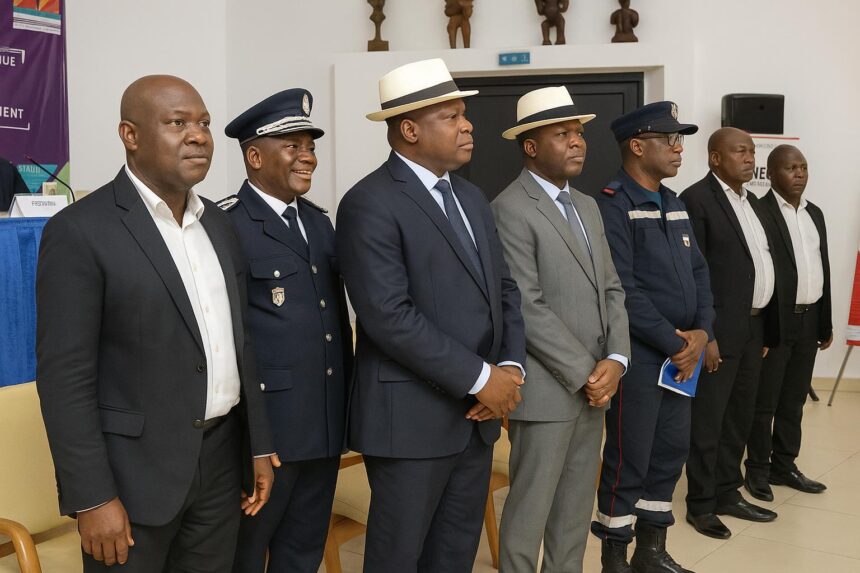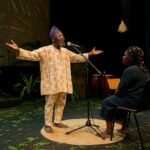Uniforms Meet Ink in Brazzaville Tribute
Under white tents at the Pierre-Savorgnan de Brazza Memorial, the usual tap of ceremonial boots made room for the rustle of pages. Brazzaville’s police and gendarmerie discovered they share more than discipline; they share stories, verse and strategic essays.
Colonel-Major Bellarmin Ndongui, head of strategy, cooperation and communication at the Interior Ministry, wants this scene to become routine. By planting what he calls a ‘seed of tradition,’ he hopes annual salutes to uniformed writers will flourish.
The inaugural ceremony on 16 September 2025 drew academics, officials and readers. Former senator Professor Ludovic Robert Miyouna presided, bridging state protocol and literary enthusiasm and showing that creativity fits comfortably beside public service in today’s Congo-Brazzaville.
Invitations were limited, yet social networks flashed images of epaulettes beside poetry, giving the public a glimpse of an institution eager to showcase intellect alongside order. The gesture matched government messaging on cultural vibrancy and civic pride.
Panel Dissects Institutional Communication
Before trophies were handed out, Professor Bienvenu Boudimbou steered a two-hour panel titled ‘Institutional Communication: Codes and Freedom.’ The discussion reminded ministry staff that information management now extends from press releases to viral clips, demanding both legal rigor and creative agility.
Communicators Joachim Mbanza, Carine Oyoma Ibombo, Calixte Itoua Ikama and IT engineer Alain Ndalla traded experiences. Their blunt message: audiences scroll fast, so accuracy must move at the same speed as rumors.
For young officers in front rows, the panel was a crash course on how a tweet can safeguard or damage credibility. They noted press law updates and the ministry’s forthcoming social-media guidelines expected later this year.
The atmosphere remained studious yet relaxed, foreshadowing the celebratory turn of the afternoon. Coffee cups disappeared, cameras appeared, and the Memorial’s courtyard morphed from classroom into literary stage without losing its sense of disciplined timing.
Eight Decorated Voices Take the Spotlight
Director-of-cabinet Séraphin Ondélé opened the homage with a reminder that ‘valorising the pen is valorising the Republic.’ Thunderous applause followed the roll-call of eight laureates, ranging from Police General Albert Ngoto to young Gendarmerie Captain Ruphin Sognélé.
Two honorees, Colonel-Major Michel Innocent Péa and Colonel Charles N’Kouanga, were represented by colleagues because of overseas duties. Their absence, organisers stressed, mirrored the operational commitments that give their essays on leadership and logistics an authentic, field-tested flavour.
Four literary critics delivered brisk, broadcast-style summaries of each book. Audiences learned that Captain Charles Peter Moukala Kinbzounza explores village reconciliation rituals, while Colonel Doctor Maurice Itous Ibara maps the evolution of public health doctrine inside the force.
Each officer accepted a handcrafted statuette alongside the new ‘Book Prize’ certificate. The symbolic pairing underscored that culture and security share the same uniform colours. Smiles widened further once a local sculptor explained the artwork represents both a quill and a sabre.
Courage, Responsibility and Strategic Thought
In his keynote, Professor Miyouna called writing ‘an act of courage and responsibility,’ echoing a sentiment once voiced by Sun Tzu. He reminded officers that authors risk critique yet also shape civic debate, turning personal reflection into strategic capital for the nation.
Quoting Julius Caesar, he drew laughter by noting that some military reports read like thrillers. Serious again, he cited generals Charles de Gaulle and André Beaufre to show how memoirs can refine doctrines, uphold democratic values and modernise defence institutions.
The keynote aligned with Interior Minister Raymond Zéphirin Mboulou’s broader agenda of professionalisation and transparency. Observers present from newspapers like Les Dépêches de Brazzaville suggested the speech positions the force as a partner in national cultural policy, not merely a security provider.
Behind the microphones, Colonel-Major Ndongui confided that the prize could expand next year to include photographers and documentary filmmakers in uniform. ‘Storytelling takes many forms,’ he said, hinting at workshops and a possible mobile library for remote barracks.
From Ceremony to Community Engagement
As sunset coloured the Congo River, guests queued for autographs. Several high-school students from Talangaï asked Captain Sognélé how discipline helps finish a chapter. His answer, ‘Write the mission order first,’ earned approving nods from teachers who hope to invite him to classrooms.
Local booksellers predict a surge in demand for the highlighted titles, noting that many citizens are curious to read policing through a literary lens. Some shops plan window displays pairing the books with miniature national flags during the upcoming civic week.
Cultural NGOs present at the event signalled interest in co-hosting reading circles inside detention centres. ‘Reflective writing can support rehabilitation,’ one volunteer commented, proposing that prisoner essays might be featured in future editions of the prize.
By closing time, organisers thanked security teams, librarians and the Memorial staff, promising that next year’s ceremony will be streamed live for Congolese abroad. If so, the ‘chevaliers of the blue uniform’ may soon ride the global wave of digital readership.





















